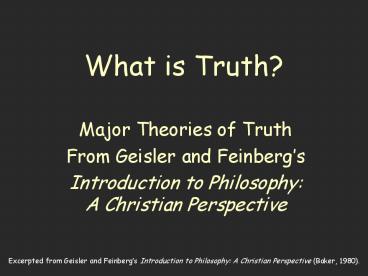What is Truth - PowerPoint PPT Presentation
1 / 16
Title:
What is Truth
Description:
Excerpted from Geisler and Feinberg's Introduction to Philosophy: A Christian ... A statement is true if and only if it ... Logical Positivism. Self-refuting ... – PowerPoint PPT presentation
Number of Views:2012
Avg rating:3.0/5.0
Title: What is Truth
1
What is Truth?
- Major Theories of Truth
- From Geisler and Feinbergs
- Introduction to Philosophy A Christian
Perspective
2
1.The Coherence Theory of Truth
- Spinoza, Leibniz, Hegel, and F.H. Bradley.
- A statement is true if and only if it coheres
(is consistent) with all of the other statements
of that system.
3
1.The Coherence Theory of Truth
- Rationaliststhe system is a comprehensive
account of the entire universe (or of reality) - Logical positiviststhe system includes all of
the statements in the scientific picture of the
world (as described by the contemporary sciences).
4
1.The Coherence Theory of Truth
- This has some meritwe do tend to reject a
statement that contradicts what we have already
embraced as truth (or contradicts our
experiences/observations).
5
1.The Coherence Theory of Truth
- Coherence is a necessary condition of truth, but
not a sufficient condition. - A statement may be coherent with one system and
incoherent with another. - A statement may be coherent with a system but not
applicable to the real world. - Two differentmutually exclusive, but
coherentsystems are logically possible.
6
2.The Pragmatic Theory of Truth
- Charles Sanders Pierce, William James, and John
Dewey. - Piercetruth is related to (observable)
practice(s) - Opinion that is fated to be ultimately agreed
to - Truth is related to practical consequences
7
2.The Pragmatic Theory of Truth
- Jamesconcerned with the effects of a belief in
the private and personal life of an individual - Soan individual could regard religious beliefs
as true if they provide vital benefits - Truth is determined by consequences
8
2.The Pragmatic Theory of Truth
- Dewey Warranted assertibility
- An idea becomes true when their draft upon
experience is verified by the promised facts. - Thus, truth follows inquiryand happens to an
idea when it is verified (warranted)
9
3.The Performative Theory of Truth
- P.F. Strawson
- True and false are not descriptive words, but
performative expressionsone is not making a
statement, but performing an action. - When you say, It is true that, you are
agreeing with, accepting, or endorsing a
statement.
10
3.The Performative Theory of Truth
- Later Strawson admitted that true has an
expressive meaning as well as a performative
meaning. - Strawson modified his position after hearing
criticisms of it.
11
4.The Correspondence Theory of Truth
- Aristotle, G.E. Moore, and Alfred Tarski.
- Truth consists in some form of correspondence
between 1. a belief or a sentence and 2.
a fact or a state of affairs.
12
4.The Correspondence Theory of Truth
- Moorea proposition is identified with the
meaning of an indicative sentence. - Something is apprehended (in understanding a
sentence) by us that is more than the mere
sentence. The proposition is the bearer of truth
or falsity.
13
4.The Correspondence Theory of Truth
- When a belief is true, that which is believed is
a fact. - When a belief is false, that which is believed is
not a fact.
14
4.The Correspondence Theory of Truth
- Tarskitruth is a property of sentences in a
particular languageand involves a relationship
(correspondence) between a sentence and reality.
15
Verification Principle
- A J Ayer (1910-1970)
- For a statement to be meaningful (true) it must
be either 1) purely definitional or else 2)
verifiable by onor of more of the five senses.
All other statements (ethical, theological,
metaphysical) are nonsense or meaningless. - Logical Positivism
- Self-refuting
16
Falsification Principle
- Anthony Flew and Karl Popper
- Any statement or proposition is meaningless
unless it is subject to falsification (at least
in principle) - Flew used it to challenge a belief in God
- Self-refuting
- But Flew recently changed his mind





















![[PDF]❤️DOWNLOAD⚡️ Truth: Developmental, Cultural, and Clinical Realms PowerPoint PPT Presentation](https://s3.amazonaws.com/images.powershow.com/10051438.th0.jpg?_=202406091110)
![[PDF]DOWNLOAD Truth: Developmental, Cultural, and Clinical Realms PowerPoint PPT Presentation](https://s3.amazonaws.com/images.powershow.com/10052111.th0.jpg?_=20240610014)
![get⚡[PDF]❤ Truth Facts: The Truthiest Truths and Factiest Facts of Everyday Life PowerPoint PPT Presentation](https://s3.amazonaws.com/images.powershow.com/10053389.th0.jpg?_=20240611117)





![[PDF] DOWNLOAD An Autobiography: The Story of My Experiments with Truth PowerPoint PPT Presentation](https://s3.amazonaws.com/images.powershow.com/10108963.th0.jpg?_=20240825071)
![Read [PDF] The TRUTH about gambling and other TRUTHS PowerPoint PPT Presentation](https://s3.amazonaws.com/images.powershow.com/10109147.th0.jpg?_=20240825105)
![[PDF] DOWNLOAD An Autobiography: The Story of My Experiments with Truth PowerPoint PPT Presentation](https://s3.amazonaws.com/images.powershow.com/10134784.th0.jpg?_=20240921034)